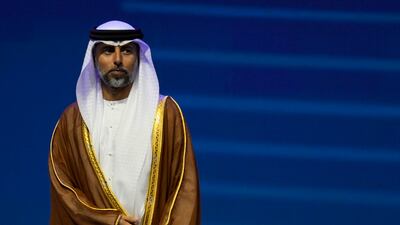Oil and gas, as well as renewables, need more investment to supply the world with the energy it requires, the UAE energy minister has said.
Opec+ countries lost 3.8 million barrels due to a lack of investment in the oil and gas sector in the past two years, Suhail Al Mazrouei, Minister of Energy and Infrastructure, said at the Abu Dhabi International Petroleum Exhibition and Conference (Adipec) on Thursday.
“The UAE is trying [its] best in providing resources in the oil and gas, but also providing the platform for transition … investing in the technology of tomorrow to address energy challenges of tomorrow,” Mr Al Mazrouei said.
This week, the UAE and the US signed a strategic partnership to invest $100 billion to produce 100 gigawatts of clean energy globally by 2035.
Through the Partnership for Accelerating Clean Energy (Pace), they plan to invest in clean energy projects in both countries, as well in emerging economies.
“We need more investments and we need to be also working on parallel on providing technology, the investments in complementing energies like hydrogen development, like solar, like wind, batteries and all of the above,” Mr Al Mazrouei said.
The UAE is also investing Dh600bn ($163.5bn) in clean and renewable energy projects over the next three decades as it aims to achieve net zero emissions by 2050.
The Emirates is building the world’s largest solar plant with a total capacity of two gigawatts in Abu Dhabi.
It is also focused on developing a hydrogen economy with an aim to capture 25 per cent of the global hydrogen market, as the demand for clean fuel rises.
Dr Sultan Al Jaber, UAE Minister of Industry and Advanced Technology, also emphasised the need to boost investment in all forms of energy during his opening speech at Adipec this week.
“The world needs all the solutions it can get. It is not oil and gas or solar, not wind or nuclear, or hydrogen. It is oil and gas and solar, and wind and nuclear, and hydrogen. It is all of the above, plus the clean energies yet to be discovered, commercialised and deployed,” said Dr Al Jaber, who is also managing director and group chief executive of Abu Dhabi National Oil Company.
Mr Al Mazrouei said oil in the long term was in “decline mode” amid green transition efforts.
“Oil, no matter how much we defend it, it’s in decline mode,” he said, while addressing the youth at Adipec on Thursday.
“To assume oil is going to be there for ever is wishful thinking,” he said, urging the younger generation to focus on energy as a whole and not just oil.
Oil demand will continue to rise even as the world moves to clean energy and the industry requires “huge investments” of $12.1 trillion until 2045 to increase production and meet demand, Opec said.
Demand for oil as a primary fuel is expected to increase to 101 million barrels of oil equivalent a day in 2045 from 88 million barrels of oil equivalent a day in 2021, with its share in the energy mix dropping to 29 per cent from 31 per cent during the period, the 13-member organisation said in its World Oil Outlook report on Monday.
The UAE is also boosting investments in the hydrocarbons sector as it aims to reach five million barrels of production capacity by 2030.


